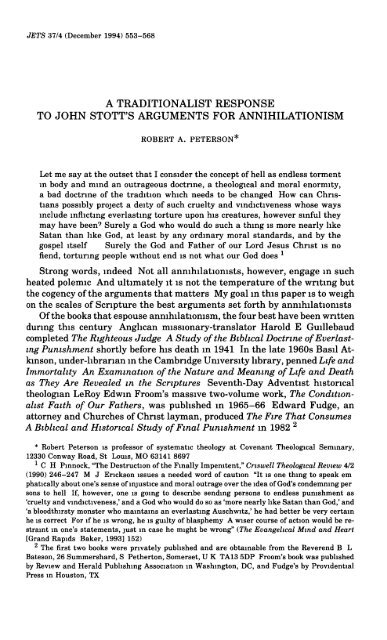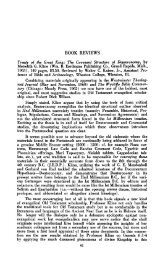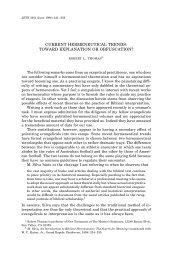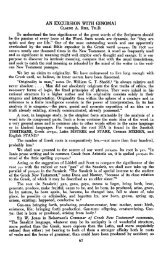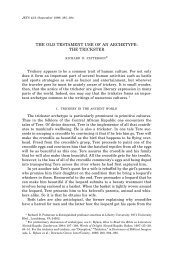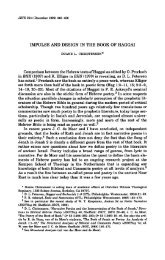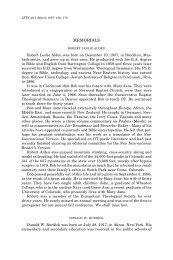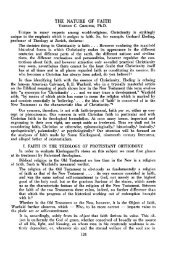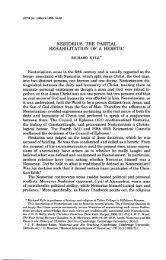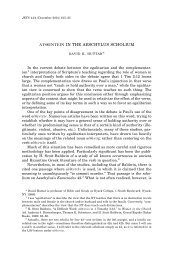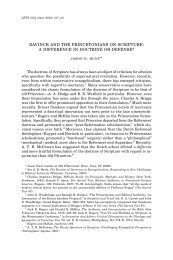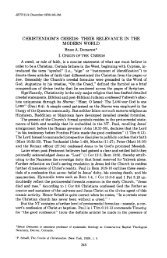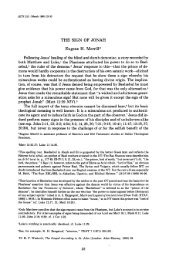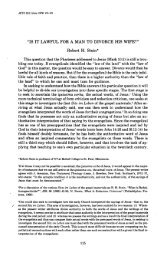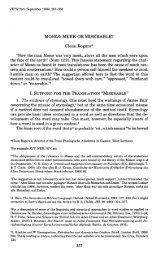a traditionalist response to john stott's arguments for annihilationism
a traditionalist response to john stott's arguments for annihilationism
a traditionalist response to john stott's arguments for annihilationism
You also want an ePaper? Increase the reach of your titles
YUMPU automatically turns print PDFs into web optimized ePapers that Google loves.
JETS 37/4 (December 1994) 553-568<br />
A TRADITIONALIST RESPONSE<br />
TO JOHN STOTT'S ARGUMENTS FOR ANNIHILATIONISM<br />
ROBERT A. PETERSON*<br />
Let me say at the outset t h a t I consider the concept of hell as endless <strong>to</strong>rment<br />
in body and mind an outrageous doctrine, a theological and moral enormity,<br />
a bad doctrine of the tradition which needs <strong>to</strong> be changed How can Christians<br />
possibly project a deity of such cruelty and vindictiveness whose ways<br />
include inflicting everlasting <strong>to</strong>rture upon his creatures, however sinful they<br />
may have been 9 Surely a God who would do such a thing is more nearly like<br />
Satan t h a n like God, at least by any ordinary moral standards, and by the<br />
gospel itself Surely the God and F a t h e r of our Lord Jesus Christ is no<br />
fiend, <strong>to</strong>rturing people without end is not what our God does x<br />
Strong words, indeed Not all annihilatiomsts, however, engage in such<br />
heated polemic And ultimately it is not the temperature of the writing but<br />
the cogency of the <strong>arguments</strong> that matters My goal in this paper is <strong>to</strong> weigh<br />
on the scales of Scripture the best <strong>arguments</strong> set <strong>for</strong>th by annihilatiomsts<br />
Of the books that espouse <strong>annihilationism</strong>, the four best have been written<br />
during this century Anglican missionary-transla<strong>to</strong>r Harold E Guillebaud<br />
completed The Righteous Judge A Study of the Biblical Doctrine of Everlasting<br />
Punishment shortly be<strong>for</strong>e his death in 1941 In the late 1960s Basil Atkinson,<br />
under-librarian in the Cambridge University library, penned Life and<br />
Immortality An Examination of the Nature and Meaning of Life and Death<br />
as They Are Revealed in the Scriptures Seventh-Day Adventist his<strong>to</strong>rical<br />
theologian LeRoy Edwin Froom's massive two-volume work, The Conditwnahst<br />
Faith of Our Fathers, was published in 1965-66 Edward Fudge, an<br />
at<strong>to</strong>rney and Churches of Christ layman, produced The Fire That Consumes<br />
A Biblical and His<strong>to</strong>rical Study of Final Punishment m 1982 2<br />
* Robert Peterson is professor of systematic theology at Covenant Theological Seminary,<br />
12330 Conway Road, St Louis, MO 63141 8697<br />
1 C H Pinnock, "The Destruction of the Finally Impenitent," Criswell Theological Review 4/2<br />
(1990) 246-247 M J Erickson issues a needed word of caution "It is one thing <strong>to</strong> speak em<br />
phatically about one's sense of injustice and moral outrage over the idea of God's condemning per<br />
sons <strong>to</strong> hell If, however, one is going <strong>to</strong> describe sending persons <strong>to</strong> endless punishment as<br />
'cruelty and vindictiveness,' and a God who would do so as 'more nearly like Satan than God,' and<br />
'a bloodthirsty monster who maintains an everlasting Auschwitz,' he had better be very certain<br />
he is correct For if he is wrong, he is guilty of blasphemy A wiser course of action would be restraint<br />
in one's statements, just in case he might be wrong" (The Evangelical Mind and Heart<br />
[Grand Rapids Baker, 1993] 152)<br />
2 The first two books were privately published and are obtainable from the Reverend Β L<br />
Bateson, 26 Summershard, S Pether<strong>to</strong>n, Somerset, U Κ TA13 5DP Froom's book was published<br />
by Review and Herald Publishing Association in Washing<strong>to</strong>n, DC, and Fudge's by Providential<br />
Press in Hous<strong>to</strong>n, TX
554 JOURNAL OF THE EVANGELICAL THEOLOGICAL SOCIETY<br />
The four books mentioned above combine <strong>to</strong> exceed 3,000 pages. None of<br />
them, however, offers a succinct summary of the best case <strong>for</strong> <strong>annihilationism</strong>.<br />
Instead, that is found in John S<strong>to</strong>tt's tentative defense of the doctrine<br />
in his nine-page <strong>response</strong> <strong>to</strong> liberal theologian David L. Edwards. 3 I will,<br />
there<strong>for</strong>e, use S<strong>to</strong>tt's summary as an outline and in footnotes cite the four<br />
books and quote from them throughout this paper <strong>to</strong> fill out S<strong>to</strong>tt's <strong>arguments</strong>.<br />
I will add one argument that S<strong>to</strong>tt mentions in passing and that<br />
features prominently in the annihilationist literature: the argument based<br />
on conditional immortality.<br />
I. THE ARGUMENT BASED ON "THE VOCABULARY OF DESTRUCTION"<br />
S<strong>to</strong>tt contends that we should understand the Bible literally when it<br />
speaks of the damned as "perishing" or suffering "destruction." He assumes<br />
that these words speak of annihilation, as is evident from his assertion: "It<br />
would seem strange, there<strong>for</strong>e, if people who are said <strong>to</strong> suffer destruction<br />
are in fact not destroyed." Addressing Edwards, his partner in dialogue, he<br />
adds: "And, as you put it, it is 'difficult <strong>to</strong> imagine a perpetually inconclusive<br />
process of perishing.'" 4<br />
How are we <strong>to</strong> evaluate these claims? First, I will examine the NT passages<br />
that S<strong>to</strong>tt maintains teach the extinction of the wicked. I admit that<br />
it is possible <strong>to</strong> construe many of these passages as teaching <strong>annihilationism</strong>.<br />
Jesus' words in Matt 10:28, <strong>for</strong> example, could be taken this way: "Do<br />
not be afraid of those who kill the body but cannot kill the soul. Rather, be<br />
afraid of the One who can destroy both soul and body in hell."<br />
Likewise Jesus' presentation of stark alternatives in the sermon on the<br />
mount could be interpreted in the same way: "Enter through the narrow<br />
gate. For wide is the gate and broad is the road that leads <strong>to</strong> destruction,<br />
and many enter through it. But small is the gate and narrow the road that<br />
leads <strong>to</strong> life, and only a few find it" (7:13-14).<br />
And John 3:16 could be unders<strong>to</strong>od as teaching the final obliteration of<br />
the wicked: "For God so loved the world that he gave his one and only Son,<br />
that whoever believes in him shall not perish but have eternal life."<br />
In fact many passages that contain "the vocabulary of destruction"<br />
could, if considered by themselves, be construed <strong>to</strong> teach the extermination<br />
of the wicked (John 10:28; 17:12; Rom 2:12; 9:22; Phil 1:28; 3:19; 1 Thess<br />
5:3; Heb 10:39; 2 Pet 3:7, 9; Jas 4:12). If Scripture gave us no other teaching<br />
on the final destiny of the wicked than that provided by these and similar<br />
passages, <strong>annihilationism</strong> would be a viable option.<br />
Some of the passages S<strong>to</strong>tt cites, however, are difficult <strong>to</strong> reconcile with<br />
<strong>annihilationism</strong>. 2 Thessalonians 1:9 is one example. Paul says of the disobedient,<br />
"They will be punished with everlasting destruction and shut out<br />
J S<strong>to</strong>tt, Evangelical Essentials A Liberal Evangelical Dialogue (Downers Grove InterVarsity,<br />
1988) 312-320<br />
4 Ibid 315-316 Cf Guillebaud, Judge 14-19, Atkinson, Life 85-100, Froom, Faith 1 1 0 5 -<br />
111, 286-302, 404-414, 486-497, Fudge, Fire 173-178, 243-250, 295-307
A TRADITIONALIST RESPONSE TO STOTT'S ANNIHILATIONISM 5 5 5<br />
from the presence of the Lord and from the majesty of his power." Annihilation<br />
is an unlikely meaning <strong>for</strong> the words "everlasting destruction." 5<br />
Furthermore, does it make sense <strong>for</strong> the apostle <strong>to</strong> describe unbelievers'<br />
extinction as their being "shut out from the presence of the Lord"? Does not<br />
their being shut out from his presence imply their existence? Not according<br />
<strong>to</strong> Atkinson, whose explanation, however, is far from convincing: "All will<br />
agree t h a t the presence of the Lord is everywhere. To be destroyed from the<br />
presence of the Lord can there<strong>for</strong>e only mean <strong>to</strong> be nowhere." 6 On the contrary,<br />
as Scot McKnight argues, "Paul has in mind an irreversible verdict<br />
of eternal nonfellowship with God. A person exists but remains excluded<br />
from God's good presence." 7<br />
The word "destruction" cannot bear the meaning S<strong>to</strong>tt assumes in Rev<br />
17:8, 11. There "destruction" is prophesied <strong>for</strong> "the beast." Two chapters<br />
later the beast and false prophet are "thrown alive in<strong>to</strong> the fiery lake of<br />
burning sulfur" (19:20). Although Fudge categorically states t h a t "in the<br />
case of the beast and false p r o p h e t . . . the lake of fire stands <strong>for</strong> utter, absolute,<br />
irreversible annihilation," 8<br />
they are still there "one thousand<br />
years" later (20:7, 10). Furthermore John teaches t h a t the beast, the false<br />
prophet and Satan "will be <strong>to</strong>rmented day and night <strong>for</strong> ever and ever"<br />
(20:10). The beast's "destruction," there<strong>for</strong>e, is not annihilation. It is eternal<br />
punishment. 9<br />
Consequently annihilatiomsts err when they claim t h a t the words "destruction,"<br />
"perish" and their synonyms signify the final extinction of the<br />
wicked. This claim cannot be established from all of the judgment passages<br />
that use these words.<br />
A second way of evaluating S<strong>to</strong>tt's claim t h a t the vocabulary of destruction<br />
teaches <strong>annihilationism</strong> is <strong>to</strong> give attention <strong>to</strong> theological methodology.<br />
Even if one could show t h a t every passage t h a t uses the language of destruction<br />
is compatible with <strong>annihilationism</strong>, this still would not prove t h a t<br />
it is true. In addition one would have <strong>to</strong> show t h a t the other passages t h a t<br />
speak of hell are consistent with <strong>annihilationism</strong>. And this cannot be done.<br />
5<br />
Annihilatiomsts claim t h a t awnios in this and similar expressions refers <strong>to</strong> eternal results<br />
and not eternal existence (see Guillebaud, Judge 7-11, Atkinson, Life 101, Froom, Faith 1 224,<br />
288-291 , 294-295, 441-443, Fudge, Fire 44-50) This claim is arbitrary and unsubstantiated<br />
On the meaning of awnios see W G Τ Shedd, The Doctrine of Endless Punishment (2d ed , New<br />
York Scribners, 1887) 82-89, S McKnight, "Eternal Consequences or Eternal Consciousness 9 ",<br />
Through No Fault of Their Own? The Fate of Those Who Have Never Heard (ed W V<br />
and J G Sigoun<strong>to</strong>s, Grand Rapids Baker, 1991) 147-157<br />
Crockett<br />
6<br />
Atkinson, Life 101 Further, he would prove <strong>to</strong>o much if his claim were true t h a t "the occurrence<br />
of the word [olethros, "destruction"] in 1 Thess 5 3 refers <strong>to</strong> the same thing as in<br />
2 Thess 1 9 " If 1 Thess 5 3 refers <strong>to</strong> annihilation it is the annihilation of Bertrand Russell, not<br />
that of the evangelical annihilatiomsts<br />
7<br />
McKnight, "Eternal" 155-156<br />
8<br />
Fudge, Fire 304<br />
9<br />
Atkinson there<strong>for</strong>e errs when he claims t h a t "the use of the word 'drown' in 1 Tim 6 9 may<br />
perhaps be felt on the whole <strong>to</strong> strengthen our view of perdition, and the two verses (8 and 11)<br />
of Rev 17 make it reasonably certain They speak of a great political and ecclesiastical power going<br />
in<strong>to</strong> perdition, and this can mean nothing but its <strong>to</strong>tal destruction and extinction" (Life 89)
556 JOURNAL OF THE EVANGELICAL THEOLOGICAL SOCIETY<br />
The Bible uses five main pictures <strong>to</strong> speak of hell: darkness and separation,<br />
fire, "weeping and gnashing of teeth," punishment, and death and<br />
destruction. Only the last fits with the view t h a t the wicked will be blotted<br />
out, and not even every passage in t h a t category fits, as we have seen. I will<br />
postpone study of the fire imagery until consideration of S<strong>to</strong>tt's second argument.<br />
For now I will examine one passage from each of the remaining<br />
three categories.<br />
1. Darkness and separation. Jesus describes the fate of the wicked in<br />
terms of separation in Luke 13:27-28. Jesus, "the owner of the house"<br />
(v. 25), will have hard words <strong>for</strong> false believers: "I don't know you or where<br />
you come from. Away from me, all you evildoers!" Jesus rejects them and<br />
expels them from his presence. He continues: "There will be weeping and<br />
gnashing of teeth" when you hypocrites see the patriarchs and even Gentiles<br />
feasting in the kingdom of God, "but you yourselves [will be] thrown<br />
out." Jesus here presupposes the existence of the wicked. They are alive<br />
and experience great pain of loss. J o h n Wenham, there<strong>for</strong>e, errs when he<br />
insists t h a t the NT language of separation from God "is another way of de-<br />
1 0<br />
scribing destruction."<br />
2. "Weeping and gnashing of teeth." Weeping signifies sorrowful cry-<br />
1 1<br />
ing, the gnashing of teeth "extreme suffering and remorse." Jesus uses<br />
this expression <strong>to</strong> explain the pictures of darkness (Matt 8:12; 22:13;<br />
25:30; Luke 13:28), fire (Matt 13:42, 50), and being cut <strong>to</strong> pieces (24:51). In<br />
each of its seven occurrences "weeping and gnashing of teeth" is preceded<br />
1 2<br />
by the adverb ekei, which means "there, in t h a t place," indicating the<br />
suffering of the wicked in hell itself. Weeping and gnashing can only be<br />
done by people who exist. It is not possible <strong>for</strong> those annihilated <strong>to</strong> cry and<br />
grind their teeth.<br />
0<br />
J Wenham, "The Case <strong>for</strong> Conditional Immortality," Universalism and the Doctrine of<br />
Hell (ed Ν M de S Cameron, Grand Rapids Baker, 1992) 172<br />
Τ McComiskey, "brygmos" New International Dictionary of New Testament Theology (ed<br />
C Brown, Grand Rapids Zondervan, 1976) 2 421<br />
So BAGD 239 Atkinson's rendering of ekei in Matt 24 51 as "on t h a t occasion" in an attempt<br />
<strong>to</strong> avoid the idea of hell as a place is arbitrary and unsupported by any lexicon "Four times<br />
in the Gospel of Matthew we are <strong>to</strong>ld t h a t on the day of judgment there will be 'weeping and<br />
gnashing of teeth' (Matt 8 12, 22 13, 24 51, 25 30) The first, second and fourth of these passages<br />
speak of'the outer darkness' and continue immediately, 'there (Greek ekei) will be weeping and<br />
gnashing of teeth ' Those who believe in the eternal conscious existence of the lost believe t h a t<br />
this weeping will be heard <strong>for</strong> ever in the outer darkness, which they rightly identify with hell<br />
If however we look at the third passage (Matt 24 51), we shall see t h a t no place is mentioned<br />
'There' means 'on t h a t occasion ' It is at the throne of judgment, as the real n a t u r e of the wicked<br />
is revealed <strong>to</strong> them in all hideousness, in despair and misery because of what they have lost and<br />
missed, as they hear the sentence, perhaps through the temporary suffering, which, as we shall<br />
see, precedes their destruction, t h a t the weeping and gnashing of teeth are heard" (Life 100) On<br />
the contrary, the expression "there there will be weeping and gnashing of teeth" is exactly the<br />
same in the four texts cited above
A TRADITIONALIST RESPONSE TO STOTT'S ANNIHILATIONISM 5 5 7<br />
Fudge's claim t h a t this expression speaks of "conscious suffering which<br />
1 3<br />
precedes final destruction" is gratui<strong>to</strong>us. Darkness, fire, and being cut <strong>to</strong><br />
pieces are pictures of final punishment in the the texts cited above, not of<br />
suffering precedent <strong>to</strong> final punishment.<br />
3. Punishment. Our Lord contrasts the fates of the wicked and righteous:<br />
"Then they [the wicked] will go away <strong>to</strong> eternal punishment, but the<br />
righteous <strong>to</strong> eternal life" (Matt 25:46). Augustine's comments deserve full<br />
quotation:<br />
Is it not folly <strong>to</strong> assume that eternal punishment signifies a fire lasting a long<br />
time, while believing that eternal life is life without end ? For Christ, in the<br />
very same passage, included both punishment and life in one and the same sentence<br />
when he said, "So those people will go in<strong>to</strong> eternal punishment, while the<br />
righteous will go in<strong>to</strong> eternal life" (Matt 25 46) If both are "eternal," it follows<br />
necessarily that either both are <strong>to</strong> be taken as long-lasting but finite, or both<br />
as endless and perpetual The phrases "eternal punishment" and "eternal life"<br />
are parallel and it would be absurd <strong>to</strong> use them in one and the same sentence<br />
<strong>to</strong> mean "Eternal life will be infinite, while eternal punishment will have an<br />
end " Hence, because the eternal life of the saints will be endless, the eternal<br />
punishment also, <strong>for</strong> those condemned <strong>to</strong> it, will assuredly have no end u<br />
Augustine's conclusion is <strong>for</strong>tified by the fact t h a t five verses earlier<br />
Jesus said t h a t the wicked will share the same destiny as the devil, who according<br />
<strong>to</strong> Rev 20:10 will suffer endlessly in the lake of fire.<br />
Good theological method dictates taking in<strong>to</strong> account the whole Bible<br />
when constructing a doctrine. Annihilationism, however, can only accommodate<br />
a portion of the Biblical passages t h a t describe the final destiny of<br />
1 5<br />
the wicked.<br />
Some may be troubled by the number of passages I earlier conceded were<br />
compatible with <strong>annihilationism</strong>. It helps <strong>to</strong> look at the way we reach conclusions<br />
concerning other doctrines. Take, <strong>for</strong> example, t h a t of the person<br />
of Christ. Jesus' statement in J o h n 14:28—"The F a t h e r is greater t h a n I " —<br />
is sometimes used <strong>to</strong> deny Christ's deity. Taken by itself, t h a t verse is compatible<br />
with such a denial. In fact some claim t h a t scores of passages t h a t<br />
teach the humanity of Christ disprove his deity. This claim is false, however,<br />
because the Bible clearly and repeatedly teaches the deity of Christ.<br />
Notice t h a t the fact t h a t many passages are compatible with a denial of<br />
l d Fudge, Fire Π1-112, 428 Cf Guillebaud, Judge 12-14, Atkinson, Life 100, Froom, Faith<br />
1 287 η 1 Κ S Harmon refutes this error ("The Case Against Conditionahsm A Response <strong>to</strong><br />
Edward William Fudge," Universahsm and the Doctrine of Hell 210-212)<br />
Augustine City of God 21 23-24 Nevertheless Froom and others claim t h a t "according <strong>to</strong><br />
the witness of Christ, then, there is eternity of result but not of process, of punishment but not<br />
of p u m s h mg of men" (Faith 1 288) This is an example of importing a distinction in<strong>to</strong> the text<br />
of Scripture in order <strong>to</strong> justify theological conclusions<br />
1 5 This exposes the fallacy of Wenham's relying <strong>to</strong>o heavily on vocabulary counts ("Case"<br />
169-174 )
558 JOURNAL OF THE EVANGELICAL THEOLOGICAL SOCIETY<br />
Christ's deity does not disprove his deity. The key <strong>to</strong> a correct understanding<br />
of the person of Christ lies in studying all of the Bible's passages.<br />
It is the same <strong>for</strong> the doctrine of hell. The fact that many passages could<br />
be interpreted as teaching <strong>annihilationism</strong> does not prove that doctrine. To<br />
be true, <strong>annihilationism</strong> has <strong>to</strong> account <strong>for</strong> all of the passages. And at this<br />
point it fails.<br />
One loose end remains: What does the vocabulary of destruction signify?<br />
I applaud the honesty of Guillebaud, who admitted: "It is not denied, that<br />
if it were clear beyond question from Bible teaching elsewhere that the<br />
doom of the lost will be everlasting <strong>to</strong>rment, it would be quite possible <strong>to</strong><br />
understanding 'death', 'destruction' and the like, as meaning a wretched<br />
and ruined existence." 16<br />
II. THE ARGUMENT BASED ON HELL-FIRE IMAGERY<br />
S<strong>to</strong>tt's second argument involves Scripture's hell-fire imagery. Un<strong>for</strong>tunately<br />
we have been misled by the experience of being burned in<strong>to</strong> associating<br />
fire with pain, <strong>for</strong> "the main function of fire is not <strong>to</strong> cause pain, but<br />
<strong>to</strong> secure destruction, as all the world's incinera<strong>to</strong>rs bear witness." 1 7 Hot<br />
s<strong>to</strong>ves have led us astray. Incinera<strong>to</strong>rs are more trustworthy guides.<br />
Some hell-fire passages can be unders<strong>to</strong>od as teaching <strong>annihilationism</strong>.<br />
John the Baptist's warning is one example: "The ax is already at the root<br />
of the trees, and every tree that does not produce good fruit will be cut down<br />
and thrown in<strong>to</strong> the fire. . . . His winnowing <strong>for</strong>k is in his hand, and he will<br />
clear his threshing floor, gathering his wheat in<strong>to</strong> the barn and burning up<br />
the chaff with unquenchable fire" (Matt 3:10, 12).<br />
A number of Jesus' sayings could be put in this category. "Every tree<br />
that does not bear good fruit is cut down and thrown in<strong>to</strong> the fire" (7:19).<br />
"If anyone does not remain in me, he is like a branch that is thrown away<br />
and withers; such branches are picked up, thrown in<strong>to</strong> the fire and burned"<br />
(John 15:6).<br />
Hebrews also contains two texts that could be construed as teaching <strong>annihilationism</strong>:<br />
"a raging fire that will consume the enemies of God" (Heb<br />
10:2); "our God is a consuming fire" (12:29).<br />
These five texts could possibly be so interpreted, but should they be? I<br />
must answer in the negative due <strong>to</strong> the Scriptural testimony that hell-fire<br />
speaks of the pain of the wicked, not their consumption.<br />
Verse 30 of Jesus' parable of the weeds sounds like the verses cited<br />
above: "Collect the weeds and tie them in bundles <strong>to</strong> be burned" (Matt<br />
13:30). The picture of the burning of the weeds was built in<strong>to</strong> the parable.<br />
If Jesus had wanted <strong>to</strong> teach <strong>annihilationism</strong>, here was an ideal occasion.<br />
He, however, concludes his explanation of the parable: "As the weeds are<br />
16 Guillebaud, Judge 16<br />
17 S<strong>to</strong>tt, Evangelical Essentials 316 Cf Guillebaud, Judge 13-14, Atkinson, Life 104-112,<br />
Froom, Faith 1 264, 291-295, 313-315, 371-372, 405-413, Fudge, Fire 99-106, 110-116, 183-<br />
187, 192-202, 285-287, 295-307
A TRADITIONALIST RESPONSE TO STOTT'S ANNIHILATIONISM 5 5 9<br />
pulled up and burned in the fire, so it will be at the end of the age. The<br />
Son of Man will send out his angels, and they will weed out of his kingdom<br />
everything that causes sin and all who do evil. They will throw them in<strong>to</strong><br />
the fiery furnace, where there will be weeping and gnashing of teeth"<br />
(13:40-42).<br />
When Jesus explained the meaning of the weeds being cast in<strong>to</strong> the furnace<br />
he did not speak of consumption. Instead he warned of suffering. He<br />
described the "fiery furnace" as a place marked by "weeping and gnashing<br />
of teeth" (v. 42). It is a place of crying and of grinding the teeth in pain.<br />
Hell-fire here speaks of anguish, not of extinction.<br />
I do not claim that this parable is incompatible with <strong>annihilationism</strong>. An<br />
annihilationist could hold that after their crying and gnashing, the damned<br />
will cease <strong>to</strong> exist. I do claim, however, that statements like the following<br />
are irresponsible: "Penal suffering comes in<strong>to</strong> the application of the parables,<br />
<strong>for</strong> a death by fire is necessarily a very awful death, but it surely is not<br />
the main point." 18 On the contrary, Jesus is capable of telling us what the<br />
main points of his parable are, and he has done so here. He uses fire <strong>to</strong><br />
speak of pain.<br />
At the end of the parable of the net, our Lord offers a similar description<br />
of hell: "This is how it will be at the end of the age. The angels will<br />
come and separate the wicked from the righteous and throw them in<strong>to</strong> the<br />
fiery furnace, where there will be weeping and gnashing of teeth" (Matt<br />
13:49-50). Again, Jesus uses hell-fire <strong>to</strong> signify anguish.<br />
His<strong>to</strong>rically the most important passage on hell in the gospels is the<br />
parable of the sheep and the goats. Jesus, the Son of Man, banishes the accursed<br />
<strong>to</strong> "the eternal fire prepared <strong>for</strong> the devil and his angels" (25:41).<br />
Does this "eternal fire" denote pain or extinction? John answers this question:<br />
"And the devil. . . was thrown in<strong>to</strong> the lake of burning sulfur . . . [and]<br />
will be <strong>to</strong>rmented day and night <strong>for</strong> ever and ever" (Rev 20:10). Here fire<br />
denotes <strong>to</strong>rment. And this <strong>to</strong>rment, not obliteration, lies ahead <strong>for</strong> the<br />
devil, evil angels, and evil human beings alike.<br />
The parable of the rich man and Lazarus uses fire imagery in the same<br />
way. The rich man died and found himself "in hell where he was in <strong>to</strong>rment."<br />
He gives the reason <strong>for</strong> his plea <strong>for</strong> mercy: "I am in agony in this fire"<br />
(Luke 16:23-24). Plainly, fire here speaks of the "agony" that one suffers in<br />
the "place of <strong>to</strong>rment" (16:25, 28).<br />
It will not do, as some annihilatiomsts have tried, <strong>to</strong> exclude this parable<br />
from the discussion because it speaks of the intermediate rather than<br />
the final state of the wicked. 19 Regardless of its precise focus we can learn<br />
from its use of hell-fire imagery. And that imagery unmistakably equates<br />
fire with <strong>to</strong>rment.<br />
The book of Revelation does the same when it says that the wicked "will<br />
drink of the wine of God's fury, which has been poured full strength in<strong>to</strong><br />
1 8 Guillebaud, Judge 14<br />
Ibid 12 Atkinson's interpretation is no better "The flame of haidees is the loss of life"<br />
(Life 50)
560 JOURNAL OF THE EVANGELICAL THEOLOGICAL SOCIETY<br />
the cup of his wrath " Is this an indication of the blotting out of the ungodly<br />
9 Hardly John continues "He will be <strong>to</strong>rmented with burning sulfur"<br />
(Rev 14 10) Here fire ("burning sulfur") is the instrument used by God <strong>to</strong><br />
punish the wicked<br />
Annihilatiomsts, however, claim that the next verse favors their cause<br />
"And the smoke of their <strong>to</strong>rment rises <strong>for</strong> ever and ever" (v 11) S<strong>to</strong>tt, <strong>for</strong><br />
example, writes<br />
The fire itself is termed "eternal" and "unquenchable," but it would be very odd<br />
if what is thrown in<strong>to</strong> it proves indestructible Our expectation would be the<br />
opposite it would be consumed <strong>for</strong> ever, not <strong>to</strong>rmented <strong>for</strong> ever Hence it is the<br />
smoke (evidence that the fire has done its work) which "rises <strong>for</strong> ever and<br />
ever " 20<br />
On the contrary, our expectation would be that the smoke would die out<br />
after the fire had finished its work How could the smoke from the fire rise<br />
<strong>for</strong>ever if its fuel had been consumed? And the rest of the verse confirms<br />
our interpretation "And the smoke of their <strong>to</strong>rment rises <strong>for</strong> ever and ever<br />
There is no rest day or night <strong>for</strong> those who worship the beast and his image,<br />
or <strong>for</strong> anyone who receives the mark of his name "<br />
It is incorrect <strong>for</strong> S<strong>to</strong>tt <strong>to</strong> claim that "it is not the <strong>to</strong>rment itself but its<br />
'smoke' (symbol of the completed burning) which will be Tor ever and<br />
ever'" 2 1 because John says "there is no rest day or night" <strong>for</strong> the wicked<br />
When annihilatiomsts assert that John here means <strong>to</strong> say that the<br />
wicked have no relief "so long as their suffering lasts" they evade the plain<br />
meaning of the text, in addition <strong>to</strong> reading in<strong>to</strong> the text something that is<br />
not there 2 2 The conclusion is irresistible In Rev 14 10-11 the imagery of<br />
burning conveys the eternal conscious <strong>to</strong>rment of the ungodly<br />
So does the picture of the lost being thrown in<strong>to</strong> the lake of fire The<br />
lake of fire first comes in<strong>to</strong> view in Rev 19 20, where the "beast" and "false<br />
prophet" were thrown alive in<strong>to</strong> it A "thousand years" later they are still<br />
there when the devil is thrown in <strong>to</strong> join them (20 7, 10) John explains<br />
what this means <strong>for</strong> all three "They will be <strong>to</strong>rmented day and night <strong>for</strong><br />
ever and ever" (20 10)<br />
The verses that immediately follow speak of all human beings standing<br />
be<strong>for</strong>e God at the last judgment People are judged, and the wicked are cast<br />
in<strong>to</strong> the lake of fire (20 14) The city of God is the final abode of the godly<br />
By contrast, the lake of fire is the place <strong>for</strong> the ungodly (21 8) Does the<br />
lake of fire mean unceasing <strong>to</strong>rment <strong>for</strong> the devil, but annihilation <strong>for</strong> lost<br />
human beings 9 Hardly As Beasley-Murray explains<br />
John's use of the symbol [of the lake of fire] shows that he views it as the<br />
alternative <strong>to</strong> the city of God, the new Jerusalem (see 21 7f ) Its significance<br />
<strong>for</strong> humanity thus begins with the new creation That it does not have the<br />
meaning of annihilation is indicated by 20 10 The lake of fire signifies not ex<br />
2 0<br />
S<strong>to</strong>tt Evangelical<br />
2 1<br />
Ibid 318<br />
Essentials 316<br />
2 2<br />
Fudge Fire 300 Cf Atkinson Life 109 Guillebaud Judge 24
A TRADITIONALIST RESPONSE TO STOTT'S ANNIHILATIONISM 5 6 1<br />
tinction in opposition <strong>to</strong> existence, but <strong>to</strong>rturous existence in the society of evil<br />
m opposition <strong>to</strong> life in the society of God 23<br />
Annihilationist attempts <strong>to</strong> argue otherwise are contrived, as is, <strong>for</strong> example,<br />
Guillebaud's. He contends that the lake of fire should be interpreted in<br />
light of the second death because of the word order in Rev 20:14 and 21:8<br />
("the lake of fire is the second death"). He then defines the second death as<br />
2 4<br />
annihilation and concludes that the lake of fire means annihilation <strong>to</strong>o.<br />
This will not do. Instead we should allow John's description of the lake<br />
of fire, given four verses earlier, <strong>to</strong> govern our understanding of it in 20:14.<br />
The second death, there<strong>for</strong>e, is another name <strong>for</strong> the lake of fire, which John<br />
teaches lasts <strong>for</strong>ever. I conclude that John uses the imagery of the lake of<br />
fire <strong>to</strong> portray condemned human beings <strong>for</strong>ever experiencing the wrath of<br />
God, away from his blessed presence.<br />
I have weighed the argument that hell-fire signifies unbelievers' extermination<br />
and found it wanting. Although some hell-fire passages could be<br />
interpreted in this way, they should not be. This is proved by the fact that<br />
fire signifies the suffering of pain, not consumption, in the six judgment passages<br />
that were examined. I conclude, there<strong>for</strong>e, that the Bible's hell-fire<br />
imagery is better illustrated by s<strong>to</strong>ves than by incinera<strong>to</strong>rs.<br />
III. THE ARGUMENT BASED ON GOD'S JUSTICE<br />
S<strong>to</strong>tt's third argument concerns justice. The Bible teaches that "God<br />
will judge people 'according <strong>to</strong> what they have done' (e.g. Rev 20:12), which<br />
implies that the penalty inflicted will be commensurate with the evil done."<br />
But eternal conscious <strong>to</strong>rment is seriously disproportionate <strong>to</strong> sins consciously<br />
committed in time. It clashes with the Biblical revelation of divine<br />
2 5<br />
justice.<br />
At first glance this argument is appealing. How are we <strong>to</strong> respond? First,<br />
by pointing out that, measured against Biblical standards, few people take<br />
sin very seriously. As evidence of this I will look at God's judgments against<br />
what might be called "little sins."<br />
An impressive list can be drawn up. Because Lot's wife looked back at<br />
Sodom and Gomorrah "she became a pillar of salt" (Gen 19:26). The death<br />
penalty <strong>for</strong> a glance?<br />
Because of irregularities in their priestly service in the tabernacle, Nadab<br />
and Abihu "fell dead be<strong>for</strong>e the Lord" (Num 3:4; see also Lev 10:1-2). Capital<br />
punishment <strong>for</strong> faulty worship?<br />
20 G R Beasley-Murray, Revelation (rev ed , Grand Rapids Eerdmans, 1978) 304<br />
Guillebaud, Judge 14 Incredibly, Atkinson concludes his discussion of Rev 20 10 as follows<br />
"Thus <strong>to</strong> be <strong>to</strong>rmented <strong>for</strong> ever means <strong>to</strong> be <strong>to</strong>rmented with the result of everlasting destruction"<br />
(Life 112)—which he understands as annihilation<br />
2 5 S<strong>to</strong>tt, Evangelical Essentials 318-319 For discussion of wider ramifications of this issue<br />
see C F H Henry, "Is It Fair?", Through No Fault 245-255, H Blocher, "Everlasting Punishment<br />
and the Problem of Evil," Universalism and the Doctrine of Hell 283-312
562 JOURNAL OF THE EVANGELICAL THEOLOGICAL SOCIETY<br />
Because he gathered sticks on the Sabbath, an unnamed man was s<strong>to</strong>ned<br />
<strong>to</strong> death at God's command (Num 15:32-36). Death by s<strong>to</strong>ning <strong>for</strong> picking<br />
up sticks?<br />
Because Moses struck the rock twice instead of speaking <strong>to</strong> it, he was denied<br />
entry <strong>to</strong> the promised land (20:11). God's faithful servant disqualified<br />
<strong>for</strong> such a minor offense?<br />
Because Achan coveted and then s<strong>to</strong>le a robe, silver and gold, he and his<br />
family were s<strong>to</strong>ned and burned (Josh 7:25). A whole family destroyed due<br />
<strong>to</strong> one person's greed?<br />
Because Uzzah steadied the ark with his hand, "the Lord's anger burned<br />
against Uzzah. . . . There<strong>for</strong>e God struck him down and he died" (2 Sam<br />
6:6-7). Punishment by death <strong>for</strong> trying <strong>to</strong> keep the ark of God from falling?<br />
Because Ananias and Sapphira lied <strong>to</strong> the apostles, God struck them<br />
dead (Acts 5:1-10). Capital punishment <strong>for</strong> lying?<br />
Our first <strong>response</strong> upon hearing these things is that justice has not been<br />
served. Repeatedly, it seems, God has been overly severe. God's assessment,<br />
however, is far different.<br />
Lot's wife disobeyed God's command and failed <strong>to</strong> heed his warning:<br />
"Don't look back, and don't s<strong>to</strong>p anywhere in the plain! Flee <strong>to</strong> the mountains<br />
or you will be swept away!" (Gen 19:17). Is God unjust <strong>to</strong> repay disobedience<br />
with previously announced penalty? Evidently Jesus did not think so, <strong>for</strong> he<br />
admonished his hearers: "Remember Lot's wife!" (Luke 17:32).<br />
Leviticus in<strong>for</strong>ms us that Nadab and Abihu acted "contrary <strong>to</strong> his [God's]<br />
command" (Lev 10:1). God regarded their disobedient priestly service as dishonoring<br />
<strong>to</strong> himself, as is evident from his evaluation of it: "Among those<br />
who approach me I will show myself holy; in the sight of all the people I will<br />
be honored" (v. 3). Will we question God's right <strong>to</strong> keep his worship pure?<br />
The punishment of the man gathering sticks reveals that in Israel God<br />
brought the previously announced penalties upon viola<strong>to</strong>rs of the Ten Commandments<br />
(Exod 20:8; 31:15; 35:2). Is he unjust <strong>to</strong> bring covenant blessings<br />
upon covenant keepers and <strong>to</strong> visit covenant curses upon covenant<br />
breakers?<br />
God evaluated Moses' act as unfaithfulness, dishonor and ungodliness:<br />
"Because you did not trust in me enough <strong>to</strong> honor me as holy in the sight<br />
of the Israelites, you will not bring this community in<strong>to</strong> the land I give<br />
them" (Num 20:12). Do we really want <strong>to</strong> offer an alternative evaluation?<br />
Achan "acted unfaithfully" (Josh 7:1) and, when confronted, confessed: "I<br />
have sinned against the Lord, the God of Israel" (7:20). Do we still want <strong>to</strong><br />
denounce God's punishing him?<br />
Uzzah was guilty of what Scripture calls "his irreverent act" (2 Sam<br />
6:7). God demands <strong>to</strong> be worshiped in truth. Israel, however, had followed<br />
the Philistines' example instead of obeying God's instructions <strong>for</strong> transporting<br />
the ark (compare 2 Sam 6:3 with Exod 25:12-14 and Num 4:5-6,<br />
15). Shall we criticize God <strong>for</strong> giving only one person what David and many<br />
others deserved?<br />
If we are offended by God's bringing capital punishment on Ananias and<br />
Sapphira because they merely lied <strong>to</strong> the apostles, we are missing Luke's
A TRADITIONALIST RESPONSE TO STOTT'S ANNIHILATIONISM 5 6 3<br />
whole point The husband and wife were ultimately guilty of lying not <strong>to</strong><br />
men but <strong>to</strong> God (Acts 5 3-4)<br />
Luke's words serve as a paradigm "not <strong>to</strong> men but <strong>to</strong> God " Our difficulty<br />
in recognizing God's justice in his punishment of "little sins" lies with the fact<br />
that we adopt a man-centered perspective rather t h a n a God-centered one If<br />
people lied <strong>to</strong> us, disobeyed us, or spoke against us, would they be worthy of<br />
death? Of course not If they do these things against God, do they deserve capital<br />
punishment 9<br />
The Bible's consistent answer is yes The Bible views sin as<br />
an attack on God's character and there<strong>for</strong>e deserving of great punishment<br />
Readers may agree with me in principle but protest t h a t all of these examples<br />
illustrate temporal punishment, not eternal This criticism is fair<br />
I have, however, saved the most scandalous example <strong>for</strong> last Because Adam<br />
ate the <strong>for</strong>bidden fruit, he plunged the h u m a n race in<strong>to</strong> sin with all of its<br />
terrible consequences Paul writes with reference <strong>to</strong> Adam's sin "The many<br />
died by the trespass of the one m a n The judgment followed one sin and<br />
brought condemnation By the trespass of the one man, death reigned<br />
through t h a t one m a n The result of one trespass was condemnation <strong>for</strong><br />
all men Through the disobedience of the one m a n the many were made<br />
sinners" (Rom 5 15-19) Is this penalty proportionate <strong>to</strong> the crime committed<br />
7 Notice the penalty Paul repeatedly says t h a t Adam's one sin brought<br />
death and condemnation There is no mistaking Paul's meaning in the context<br />
of Romans Due <strong>to</strong> Adam's sin, physical and spiritual d e a t h — e v e n eternal<br />
condemnation—came <strong>to</strong> the h u m a n race "The result of one trespass<br />
was condemnation <strong>for</strong> all men" (5 18) Damnation of the world due <strong>to</strong> one<br />
man's eating a piece of fruit?<br />
Perhaps we have misunders<strong>to</strong>od the significance of Adam's eating the<br />
<strong>for</strong>bidden fruit J o h n Calvin thinks so<br />
To regard Adam's sin as glut<strong>to</strong>nous intemperance (a common notion) is childish<br />
As if the sum and head of all virtues lay in abstaining solely from one<br />
fruit, when all sorts of desirable delights abounded everywhere, and not only<br />
abundance but also magnificent variety was at hand in that blessed fruitfulness<br />
of earth'<br />
Calvin advises us <strong>to</strong> look more deeply in<strong>to</strong> the account of the fall of Adam<br />
in Genesis 3<br />
Augustine speaks rightly when he declares that pride was the beginning of all<br />
evils For if ambition had not raised man higher than was meet and right, he<br />
could have remained in his original state But we must take a fuller definition<br />
from the nature of the temptation which Moses describes It is already<br />
clear that disobedience was the beginning of the Fall This Paul also confirms,<br />
teaching that all were lost through the disobedience of one man Yet it is at<br />
the same time <strong>to</strong> be noted that the first man revolted from God's authority<br />
because, contemptuous of truth, he turned aside <strong>to</strong> falsehood Unfaithfulness,<br />
2 6<br />
then, was the root of the Fall<br />
2 6 J Calvin, Institutes of the Christian Religion (LCC, ed J Τ McNeill, Philadelphia West<br />
minster 1960) 20 245 (italics mine)
564 JOURNAL OF THE EVANGELICAL THEOLOGICAL SOCIETY<br />
Pride, disobedience, unfaithfulness. These words summarize the significance<br />
of Adam's primal sin if viewed from a God-centered perspective. Adam<br />
pridefully wanted <strong>to</strong> be like his Maker. He disobeyed God's prohibition. And<br />
he was unfaithful <strong>to</strong> his Lord (Gen 3:1-6). Will we charge him with injustice<br />
who warned that "you must not eat from the tree of the knowledge of good<br />
and evil, <strong>for</strong> when you eat of it you will surely die" (Gen 2:17)? Do we accept<br />
the evaluation of him who declared, "The judgment followed one sin and<br />
brought condemnation" (Rom 5:16)? Or will we follow Adam's footsteps and<br />
revolt against our Maker?<br />
If we are <strong>to</strong> submit <strong>to</strong> the authority of God's Word, we must accept the<br />
fact that God is not unjust <strong>for</strong> punishing the human race with condemnation<br />
<strong>for</strong> Adam's sin—and not only <strong>for</strong> Adam's sin, but <strong>for</strong> our individual sins<br />
as well. Be<strong>for</strong>e Paul treats original sin in Romans 5 he deals with actual sin<br />
in the earlier chapters: "The wrath of God is being revealed from heaven<br />
against all the godlessness and wickedness of men. . . . Although they know<br />
God's righteous decree that those who do such things deserve death, they<br />
not only continue <strong>to</strong> do these very things but also approve of those who<br />
practice them. . . . Because of your stubbornness and unrepentant heart,<br />
you are s<strong>to</strong>ring up wrath against yourself <strong>for</strong> the day of God's wrath, when<br />
his righteous judgment will be revealed. . . . All who sin apart from the law<br />
will also perish apart from the law, and all who sin under the law will be<br />
judged by the law. . . . There is no one righteous, not even one; there is no<br />
one who . . . seeks God. All have turned away, they have <strong>to</strong>gether become<br />
worthless; there is no one who does good, not even one. . . . All have sinned<br />
and come short of the glory of God" (Rom 1:18, 32; 2:5, 12; 3:10-12, 23).<br />
We must learn about divine justice from the Bible itself. It will not do<br />
<strong>to</strong> protest God's revealed judgments on the basis of what seems fair or unfair<br />
<strong>to</strong> us. Instead we must adjust our thinking, including our view of God's<br />
justice, <strong>to</strong> God's truth.<br />
Annihilationist Guillebaud wisely calls <strong>for</strong> restraint:<br />
For the words of the Lord Jesus Christ with regard <strong>to</strong> the condemned are so<br />
terrible, so final in excluding any idea that mercy may be open <strong>to</strong> them, that<br />
we dare not presume <strong>to</strong> set limits in advance as <strong>to</strong> what He might see fit <strong>to</strong><br />
ordain as their punishment. The character of God is safe in the hands of His<br />
Son, who came <strong>to</strong> reveal Him, and we must trust Him, and receive what He<br />
tells us. The question is simply, What do His words mean! 21<br />
Although Guillebaud reaches different conclusions than I concerning the<br />
fate of the ungodly, I respect his refusal <strong>to</strong> argue <strong>for</strong> <strong>annihilationism</strong> based<br />
on a preconceived notion of divine justice.<br />
In fact the annihilatiomsts' argument from justice can be turned against<br />
their position. On the basis of what universalists deem just and unjust,<br />
they reject eternal punishment and <strong>annihilationism</strong> as unworthy of a loving<br />
God. So J. A. T. Robinson:<br />
Guillebaud, Judge 47.
A TRADITIONALIST RESPONSE TO STOTT'S ANNIHILATIONISM 5 6 5<br />
Christ, in Ongen's old words, remains on the Cross so long as one sinner remains<br />
in hell That is not speculation it is a statement grounded in the very<br />
necessity of God's nature In a universe of love there can be no heaven which<br />
<strong>to</strong>lerates a chamber of horrors, no hell <strong>for</strong> any which does not at the same time<br />
2 8<br />
make it hell <strong>for</strong> God<br />
Actually the annihilationist argument based on justice is not a new argument<br />
but a very old one And Thomas Aquinas still offers the best <strong>response</strong><br />
Further, the magnitude of the punishment matches the magnitude of the<br />
sin Now a sin that is against God is infinite, the higher the person against<br />
whom it is committed, the graver the sin—it is more criminal <strong>to</strong> strike a head<br />
of state than a private citizen—and God is of infinite greatness There<strong>for</strong>e an<br />
2 9<br />
infinite punishment is deserved <strong>for</strong> a sin committed against him<br />
Aquinas is right Sin is an attack on the infinitely holy character of God<br />
God there<strong>for</strong>e justly sets the penalties <strong>for</strong> sin in this world and the next<br />
He righteously condemns sinners <strong>for</strong> Adam's sin and <strong>for</strong> their own sins<br />
And he plainly teaches t h a t he punishes the wicked <strong>for</strong>ever I conclude t h a t<br />
he is just in so doing<br />
IV. THE ARGUMENT BASED ON THE UNIVERSALIST PASSAGES<br />
S<strong>to</strong>tt's fourth and final argument <strong>for</strong> <strong>annihilationism</strong> is based on supposed<br />
universahst passages S<strong>to</strong>tt cannot endorse universalism because the<br />
Bible teaches the reality of hell<br />
My point here, however, is that the eternal existence of the impenitent in hell<br />
would be hard <strong>to</strong> reconcile with the promises of God's final vic<strong>to</strong>ry over evil,<br />
or with the apparently universalista texts These texts lead me <strong>to</strong> ask<br />
how God can in any meaningful sense be called "everything <strong>to</strong> everybody"<br />
[1 Cor 15 28] while an unspecified number of people still continue in rebellion<br />
3 0<br />
against him and under his judgment<br />
Once again S<strong>to</strong>tt's argument can be turned against him 1 Corinthians<br />
15 24-28 is used more t h a n any other Biblical passage <strong>to</strong> "prove" universalism<br />
"Then the end will come, when he hands over the kingdom <strong>to</strong> God<br />
the F a t h e r after he has destroyed all dominion, authority and power For<br />
he must reign until he has put all his enemies under his feet When he<br />
has done this, then the Son himself will be made subject <strong>to</strong> him who put<br />
everything under him, so t h a t God may be all in all " S<strong>to</strong>tt argues t h a t<br />
1 Corinthians X5 does not teach universalism On what basis 9 He correctly<br />
accuses universaliste of taking this and similar passages apart from the<br />
rest of the Bible's teachings Yet S<strong>to</strong>tt makes the same mistake when he<br />
cites these passages in support of <strong>annihilationism</strong><br />
2 8 J A Τ Robinson, In the End God (New York Harper, 1968) 133<br />
2 9 Τ Aquinas, Summa Theologiae (New York McGraw Hill, 1974) Ia2ae 87,4<br />
3 0 S<strong>to</strong>tt, Evangelical Essentials 319 Cf Guillebaud, Judge 5-6, Atkinson, Life 112, Froom,<br />
Faith 1 23-25, 269, 301-302, 413-414, 518-519
566 JOURNAL OF THE EVANGELICAL THEOLOGICAL SOCIETY<br />
In fact, appeal <strong>to</strong> "universalist" texts proves neither universalism nor<br />
<strong>annihilationism</strong>. Instead we must study the whole Bible <strong>to</strong> understand the<br />
final state of affairs. The crucial question: What does God deem compatible<br />
with his being "all in all"? This question is answered by the Bible's final<br />
three chapters. God's ultimate vic<strong>to</strong>ry does not involve the eradication of<br />
evil beings from his universe.<br />
Revelation 20:11-15 describes the last judgment. Here John sees "the<br />
dead, great and small, standing be<strong>for</strong>e the throne" of God. That "the<br />
sea, . . . death and Hades" give "up the dead that were in them" (Rev 20:13)<br />
refers <strong>to</strong> the resurrection, because it makes no sense <strong>to</strong> speak of the sea giving<br />
up souls. Rather, this is God's way of affirming the universal resurrection.<br />
Even those who died at sea will be raised <strong>to</strong> stand be<strong>for</strong>e God.<br />
Immediately be<strong>for</strong>e his presentation of the last judgment, John had<br />
taught that the devil, beast and false prophet were thrown in<strong>to</strong> the lake of<br />
fire <strong>to</strong> suffer everlasting <strong>to</strong>rment (Rev 20:10). Now, four verses later, he<br />
teaches that wicked human beings share their fate (20:14).<br />
Revelation 21:1-8 confirms this conclusion. There alongside the new<br />
heaven and the new earth John describes the final destination of the unrepentant<br />
as "the fiery lake of burning sulfur" (21:8). Evidently God does not<br />
view unbelievers' being eternally alive in the lake of fire as incompatible<br />
with his being "all in all." Moreover the picture of the righteous and unrighteous<br />
living <strong>for</strong>ever in bliss and misery, respectively, does not fit either<br />
universalism or <strong>annihilationism</strong>.<br />
That God's ultimate vic<strong>to</strong>ry does not include the annihilation of the<br />
damned is substantiated by the picture of the new Jerusalem in Revelation<br />
21-22. John reveals the bliss of those privileged <strong>to</strong> live in this city. God will<br />
be in their midst <strong>to</strong> "wipe every tear from their eyes." For them "there will<br />
be no more death or mourning or crying or pain" (21:3-4). Does John here<br />
teach the absolute banishment of death and pain? The answer is no, because<br />
four verses later he speaks of the wicked in the lake of fire (21:8).<br />
Furthermore in chap. 22 he contrasts the joy of those who "may go<br />
through the gates in<strong>to</strong> the city" of God with the misery of the godless who<br />
are "outside" the city: "Outside are the dogs, those who practice magic arts,<br />
the sexually immoral, the murderers, the idolaters, and everyone who<br />
practices falsehood" (22:14-15). Plainly the wicked are not annihilated. Instead<br />
they are alive but cut off from the happiness of eternal fellowship<br />
with God. 31<br />
If my exegesis of Revelation 20-22 is correct, universalists and annihilatiomsts<br />
would have <strong>to</strong> claim that the end depicted in Scripture's last three<br />
3 1 Froom's reasons <strong>for</strong> holding that the end depicted in Revelation 2 0 - 2 1 "involves the termination<br />
of all sinful and estranged life" (Faith 1 301) do not hold up <strong>to</strong> scrutiny If the words<br />
"fire came down out of heaven and devoured them" (Rev 20 9) refers <strong>to</strong> <strong>annihilationism</strong>, it is extinction<br />
at death, not extinction following resurrection and judgment, as evangelical annihilatiomsts<br />
hold "The <strong>for</strong>mer things are passed away" (21 4) refers not <strong>to</strong> the blotting out of the<br />
wicked but <strong>to</strong> the end of death, sorrow, crying and pain <strong>for</strong> the righteous, as the first half of the<br />
verse indicates Death and Hades being cast in<strong>to</strong> the lake of fire does not signify the obliteration<br />
of the wicked but the end of the power of the first death over human beings
A TRADITIONALIST RESPONSE TO STOTT'S ANNIHILATIONISM 5 6 7<br />
chapters is not ultimate. There is still more <strong>to</strong> come after Revelation 22.<br />
Later God will save all the wicked (universalism) or annihilate them (<strong>annihilationism</strong>).<br />
But these scenarios will not square with Revelation 21-22,<br />
which presents the ultimate end, the new heaven and new earth (21:1-8;<br />
22:12-15).<br />
We conclude that the traditional view of hell better fits the Scriptural vision<br />
of the end than does <strong>annihilationism</strong>. The Bible's concluding chapters<br />
will not allow us <strong>to</strong> understand the "universalist" passages in an absolute<br />
sense. God's being "all in all" means that he reigns over the just and the unjust.<br />
It does not mean that only the <strong>for</strong>mer remain.<br />
I have examined John S<strong>to</strong>tt's four <strong>arguments</strong> <strong>for</strong> <strong>annihilationism</strong> and<br />
have not found them compelling. I there<strong>for</strong>e must respectfully disagree with<br />
him when he urges "that the ultimate annihilation of the wicked should at<br />
least be accepted as a legitimate, biblically founded alternative <strong>to</strong> their<br />
3 2<br />
eternal conscious <strong>to</strong>rment."<br />
V. THE ARGUMENT BASED ON CONDITIONAL IMMORTALITY<br />
There is at least one other argument <strong>for</strong> <strong>annihilationism</strong> that merits attention.<br />
Conditional immortality is sometimes used as another name <strong>for</strong><br />
<strong>annihilationism</strong>. This is the view that souls are not naturally immortal but<br />
that immortality is a gift given by God only <strong>to</strong> the righteous who, as a result,<br />
live <strong>for</strong>ever. The unrighteous, however, because they lack the gift of<br />
immortality are annihilated and cease <strong>to</strong> exist. Clark Pinnock regards this<br />
issue as crucial.<br />
This is clearly an important issue in our discussion because belief in the natural<br />
immortality of the soul which is so widely held by Christians, although<br />
stemming more from Pla<strong>to</strong> than the Bible, really drives the traditional doctrine<br />
of hell more than exegesis does. Consider the logic if souls must live <strong>for</strong>ever<br />
because they are naturally immortal, the lake of fire must be their home<br />
<strong>for</strong>ever and cannot be their destruction . I am convinced that the hellenistic<br />
belief in the immortality of the soul has done more than anything else<br />
(specifically more than the Bible) <strong>to</strong> give credibility <strong>to</strong> the doctrine of everlasting<br />
conscious punishment of the wicked 33<br />
This argument has been vastly overrated. I say this <strong>for</strong> the following<br />
reasons. First, although philosophy has influenced all periods of Church<br />
his<strong>to</strong>ry, those who have argued <strong>for</strong> a traditional view of hell have done so<br />
because they believed that this is what the Bible taught. This is true, <strong>for</strong> example,<br />
of Tertullian, Augustine, Thomas, Luther, Calvin, Edwards and<br />
Shedd, <strong>to</strong> name a few stalwarts of orthodoxy. It is ludicrous <strong>to</strong> argue that<br />
they believed in eternal <strong>to</strong>rment because they were misled by Pla<strong>to</strong>nic philosophy.<br />
Rather, if we take their own claims seriously they believed in this<br />
3 2 S<strong>to</strong>tt, Evangelical Essentials 320<br />
3 3 Pinnock, "Destruction" 252 Cf S<strong>to</strong>tt, Evangelical Essentials 316, Guillebaud, Judge 1-4,<br />
Atkinson, Life 1-53, Froom, Faith 1 1 9 - 2 3 , 3 1 - 4 1 , 145-159, 205-206, 212, 233, 262, 265, 3 0 5 -<br />
308, 319-324, 523-528, Fudge, Fire 51-76
568 JOURNAL OF THE EVANGELICAL THEOLOGICAL SOCIETY<br />
terrible doctrine out of fidelity <strong>to</strong> Biblical teaching and sometimes against<br />
their own natural inclinations.<br />
Second, these figures' view of immortality was not Pla<strong>to</strong>nic but Biblical.<br />
They did not hold that the souls of humans were inherently immortal as did<br />
Pla<strong>to</strong>. Rather, acknowledging that God "alone is immortal," as Paul says<br />
(1 Tim 6:16), they taught that the immortal God grants immortality <strong>to</strong> all<br />
human beings.<br />
Third, we need <strong>to</strong> define the concept of the immortality of the soul. In<br />
fact, due <strong>to</strong> widespread confusion it may be wise <strong>to</strong> abandon the expression.<br />
Some use the words "the immortality of the soul" <strong>to</strong> refer <strong>to</strong> the survival of<br />
the immaterial part of human nature after death. This is a Biblical idea 34<br />
but is better called the survival of the human soul or spirit in the intermediate<br />
state. We confuse the intermediate and final states if we refer <strong>to</strong> the<br />
<strong>for</strong>mer by the expression "the immortality of the soul."<br />
Most use "the immortality of the soul" <strong>to</strong> describe our final destiny. This<br />
<strong>to</strong>o is misleading because our final state will not be a disembodied spiritual<br />
existence in heaven but a holistic resurrected life on the new earth under<br />
the new heaven. All things considered, it is better <strong>to</strong> talk about the immortality<br />
of human beings, not of souls. This is in keeping with the language<br />
of 1 Corinthians 15, which says of the resurrected righteous: "For the perishable<br />
must clothe itself with the imperishable, and the mortal with immortality"<br />
(1 Cor 15:53).<br />
Finally, and most importantly, I do not believe in the traditional view<br />
of hell because I accept the immortality of human beings but the other way<br />
around. I believe in the immortality of human beings because the Bible<br />
clearly teaches everlasting damnation <strong>for</strong> the wicked.<br />
VI. CONCLUSION<br />
I have set <strong>for</strong>th the case <strong>for</strong> <strong>annihilationism</strong> from the writings of its proponents.<br />
I have weighed their <strong>arguments</strong> on the scales of Scripture and<br />
have found those <strong>arguments</strong> wanting. In the process my conviction that the<br />
Church's traditional doctrine of hell is correct has been strengthened. 35<br />
3 4 For the best recent defense see J W Cooper, Body, Soul, and Life Everlasting Biblical<br />
Anthropology and the Monism-Dualism Debate (Grand Rapids Eerdmans, 1989)<br />
3 5 My new book entitled Hell on Trial The Case <strong>for</strong> Eternal Punishment is scheduled <strong>for</strong> release<br />
by Presbyterian and Re<strong>for</strong>med Publishing Company in the spring of 1995


